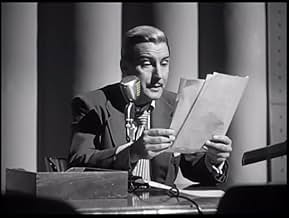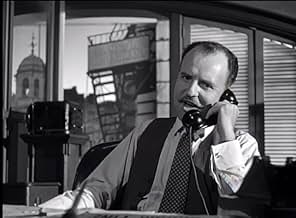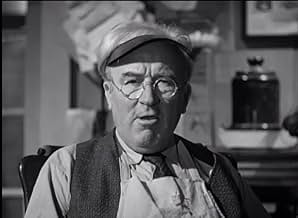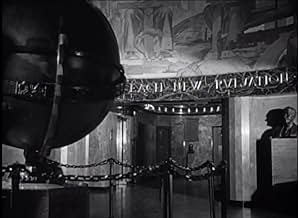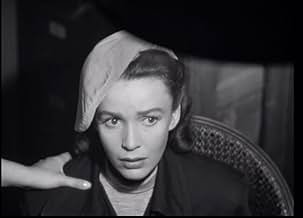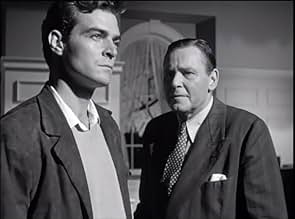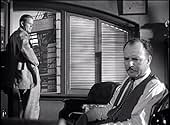Agrega una trama en tu idiomaThe story of the fight of a small-town newspaper to free an innocent girl of a murder charge, with the publisher of a metropolitan city newspaper heading, by forced circumstances, the opposi... Leer todoThe story of the fight of a small-town newspaper to free an innocent girl of a murder charge, with the publisher of a metropolitan city newspaper heading, by forced circumstances, the opposing forces.The story of the fight of a small-town newspaper to free an innocent girl of a murder charge, with the publisher of a metropolitan city newspaper heading, by forced circumstances, the opposing forces.
- Dirección
- Guionistas
- Elenco
- Carl Durham
- (as Howard da Silva)
- Munsey's Assistant
- (sin créditos)
- Dirección
- Guionistas
- Todo el elenco y el equipo
- Producción, taquilla y más en IMDbPro
Opiniones destacadas
It carries the Warner Bros. patina - a gritty crime melodrama with a mix of social commentary and thick-ear rough stuff, and with a curious collection of supporting characters. Howard Da Silva, Gale Storm, Michael O'Shea and Harry Shannon all do themselves credit and Herbert Marshall(?) also manages to fit in.
This is a good semi-noir. It starts off as one but switches in mid-picture to straight drama and then back again. Only 90" long, it holds your interest throughout. It may not sound promising but sometimes you can't judge a movie by its title.
The movie also provides Howard Da Silva with one of his last roles before he was to be blacklisted for over 10 years. Always good at playing thugs, he's quite colorful and does a lot of scenery chewing as a powerful crime figure.
The script is intelligent and gritty, and the photography is appropriately stark and oppressive.
A mash-up of newspaper drama, small-town expose, and gangster picture, some of this works, but not a lot. The Reese character is neither helped or hindered by the casting of Duryea: if it was the filmmakers' intention to keep the audience guessing whether or not he was a slime ball at heart or was decent beneath the surface, then Duryea is a good pick, as I still wasn't sure by the end how much of a creep he really was. I say all of this as somebody who is an overall big fan of Dan Duryea. Marshall was awful, turning in an amateur-level performance during his big emotional scenes, although he was never exactly great at that kind of thing. Gale Storm didn't make much of an impression, either. Howard DaSilva has a couple of good scenes as the chief gang boss. This was the final film appearance for Edward Van Sloan, who had been a mainstay in Universal's horror films of the 1930's.
Dan Duryea, as usual, is interesting as "Mike Reese," a bad guy-turned-good guy journalist. He is joined in the cast by Herbert Marshall, Gale Storm (one of the great names in show business and who will forever be "My Little Margie" to those of us who were around in the '50s), Howard Da Silva and Michael O'Shea.
Of the above-mentioned, Da Silva was the most fascinating, as the brutal mob boss "Carl Durham." He only had a minor role, but some of his lines were outstanding and his role was memorable. Da Silva was a great actor for film noirs. This isn't really a noir, but it's close. Marshall was just fine as the newspaper owner.
The film was not kind to the newspaper business, so some media-minded film critics (who probably had columns in daily papers) didn't like this film for that reason. Too bad. They should have liked it, since it had Left Wing written all over it, with several Liberal themes and favorite catch-phrases such as "witch hunts" (one of their all-time favorites).
Nonetheless, it's a powerful film and well-acted.
¿Sabías que…?
- TriviaThe "N" word is overdubbed with "Negro" on at least two occasions. [Note: this may be a local station's practice; the version shown on TCM contains the uncensored language.]
- ErroresAt the funeral, there is a headstone marked "Robert Elis 1720-1777". After the service, as the mourners are leaving, the same headstone appears in a completely different place.
- Citas
District Attorney Ralph Munsey: Take it easy, Reese. Things are tough all over. Pretty soon a man won't be able to sell his own mother.
- Versiones alternativasThe manufacture-on-demand DVD from Warner Archive Collection has the opening and closing 1992 Warner Bros. Pictures logos.
- ConexionesReferences Bernadette (1943)
Selecciones populares
- How long is The Underworld Story?Con tecnología de Alexa
Detalles
- Fecha de lanzamiento
- País de origen
- Idioma
- También se conoce como
- The Underworld Story
- Locaciones de filmación
- Los Angeles City Hall - 200 North Spring Street, Downtown, Los Ángeles, California, Estados Unidos("The Turk" was murdered on the steps of City Hall)
- Productora
- Ver más créditos de la compañía en IMDbPro
- Tiempo de ejecución
- 1h 31min(91 min)
- Color
- Relación de aspecto
- 1.37 : 1

